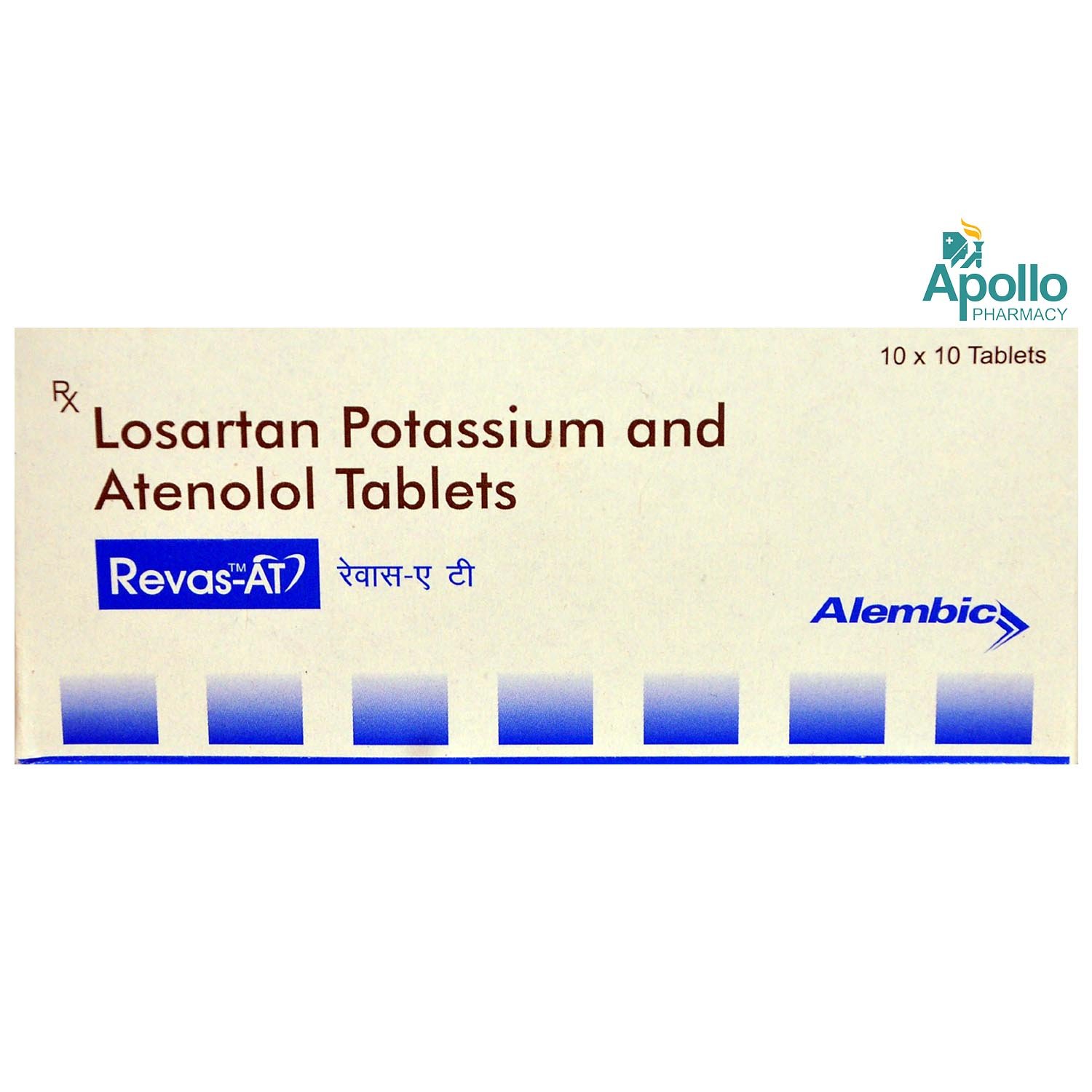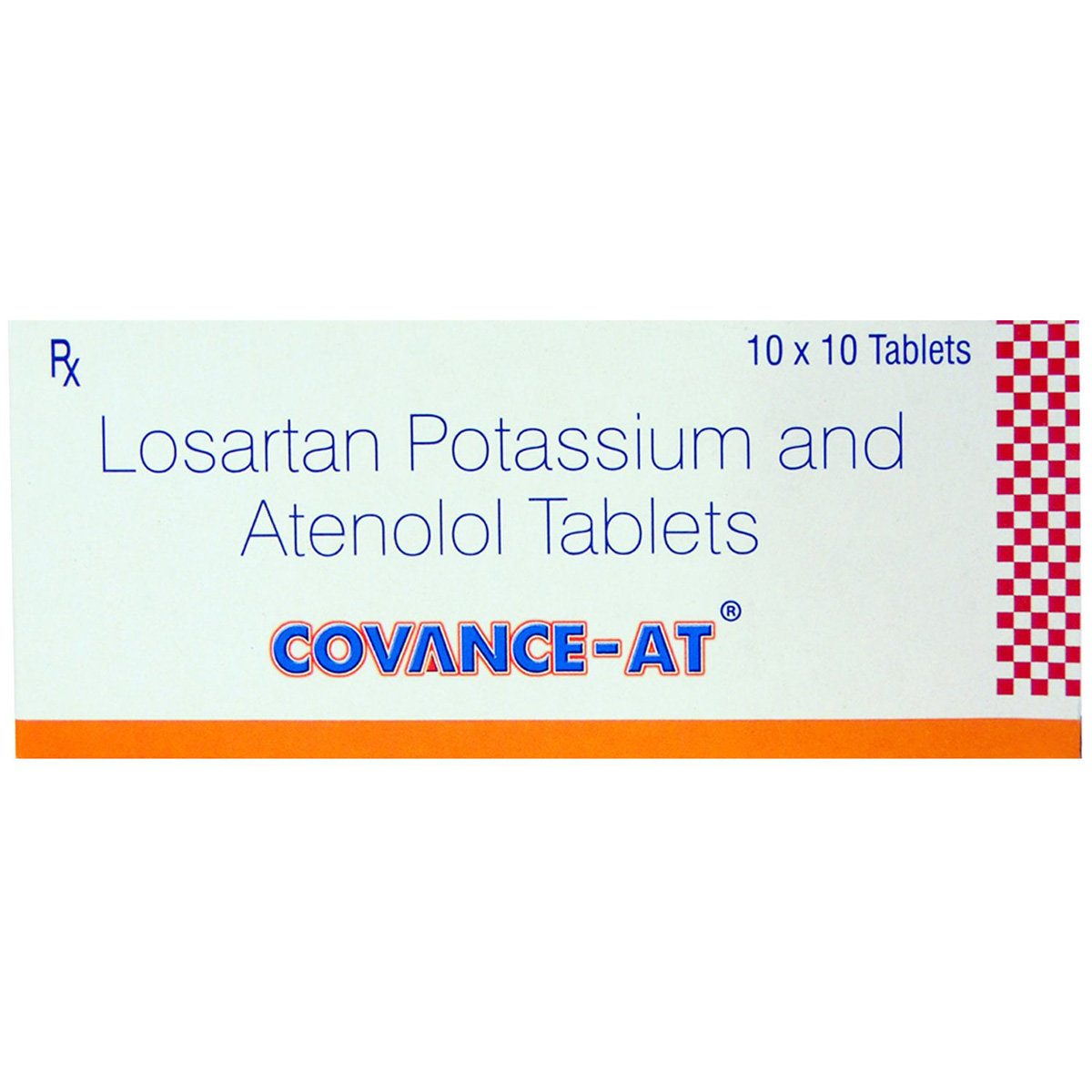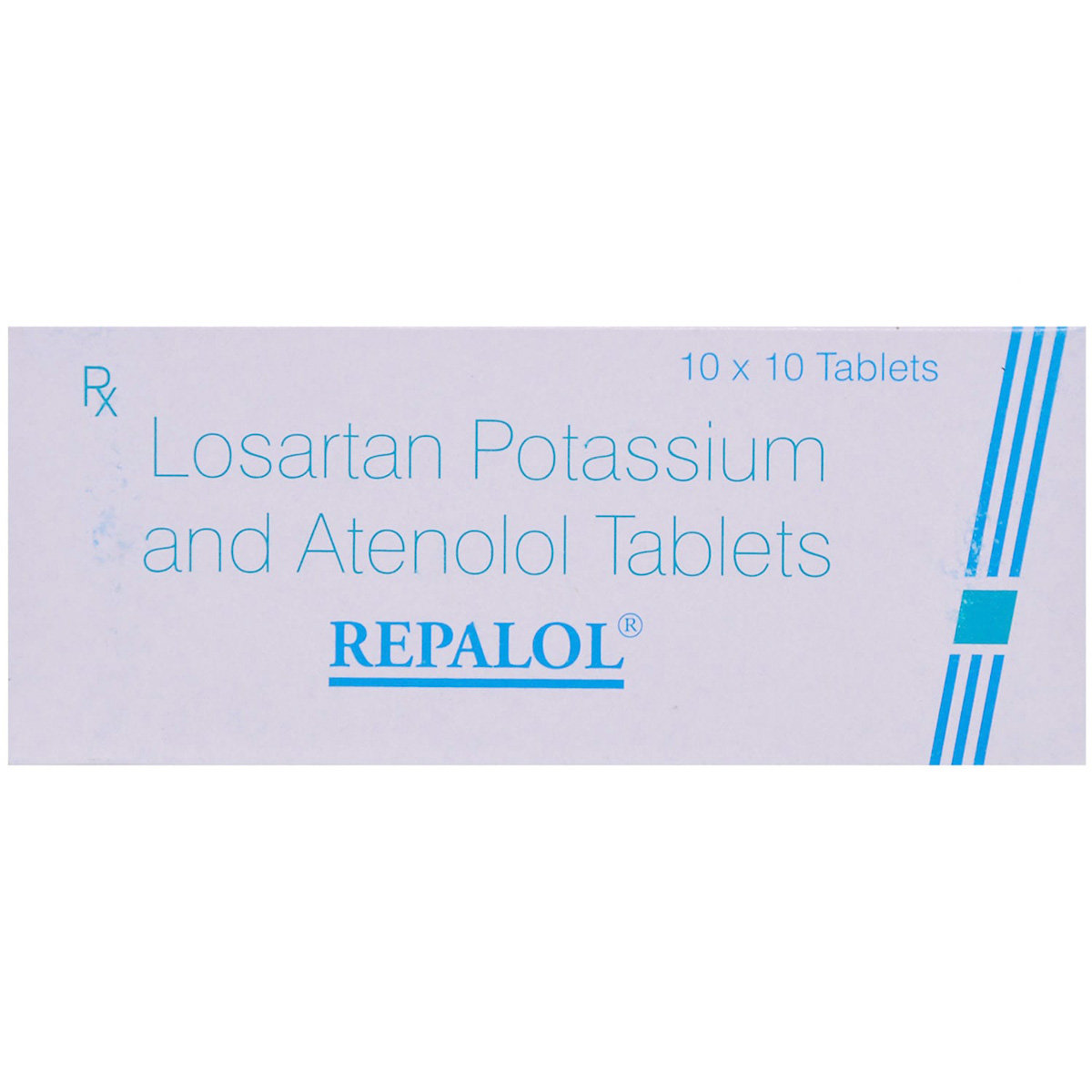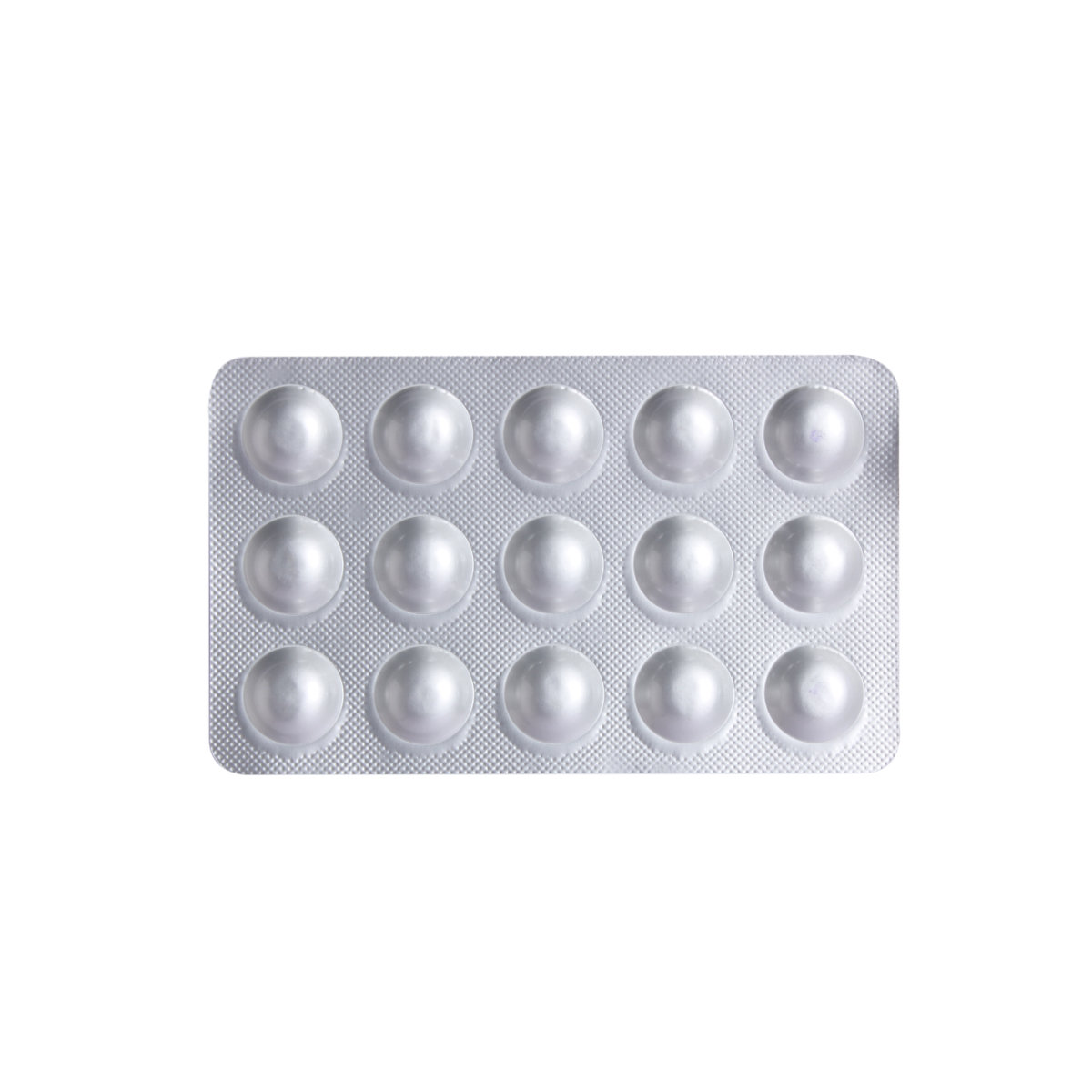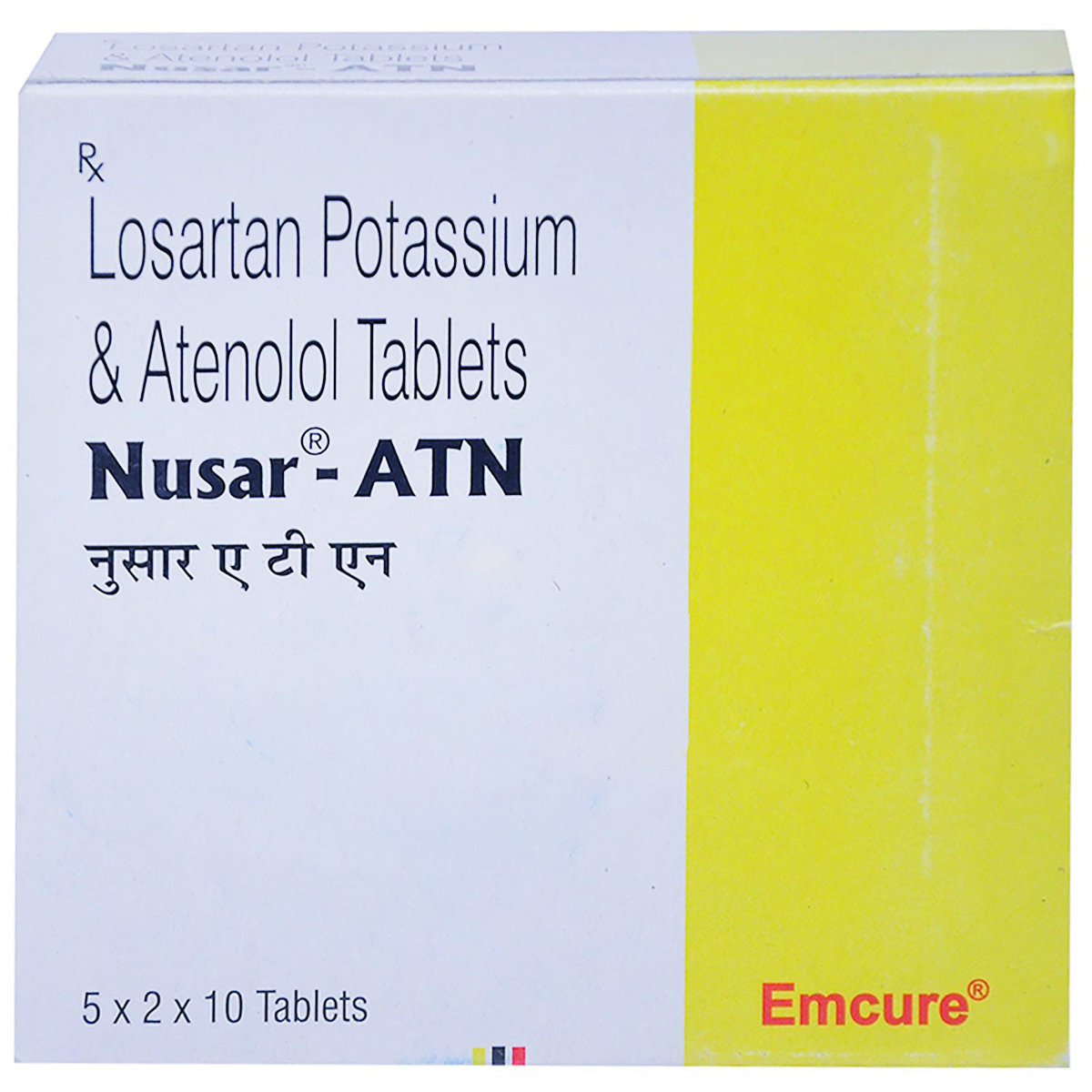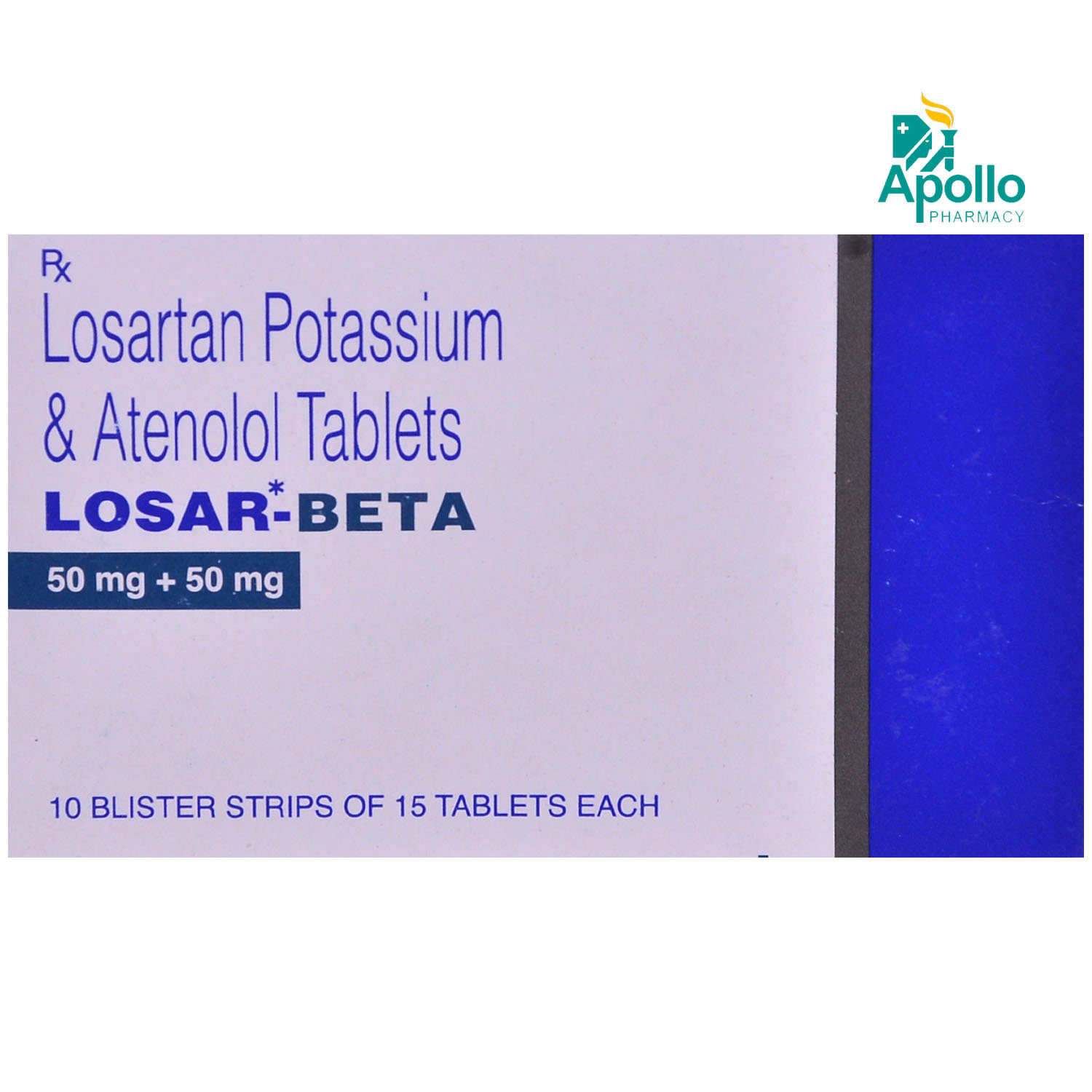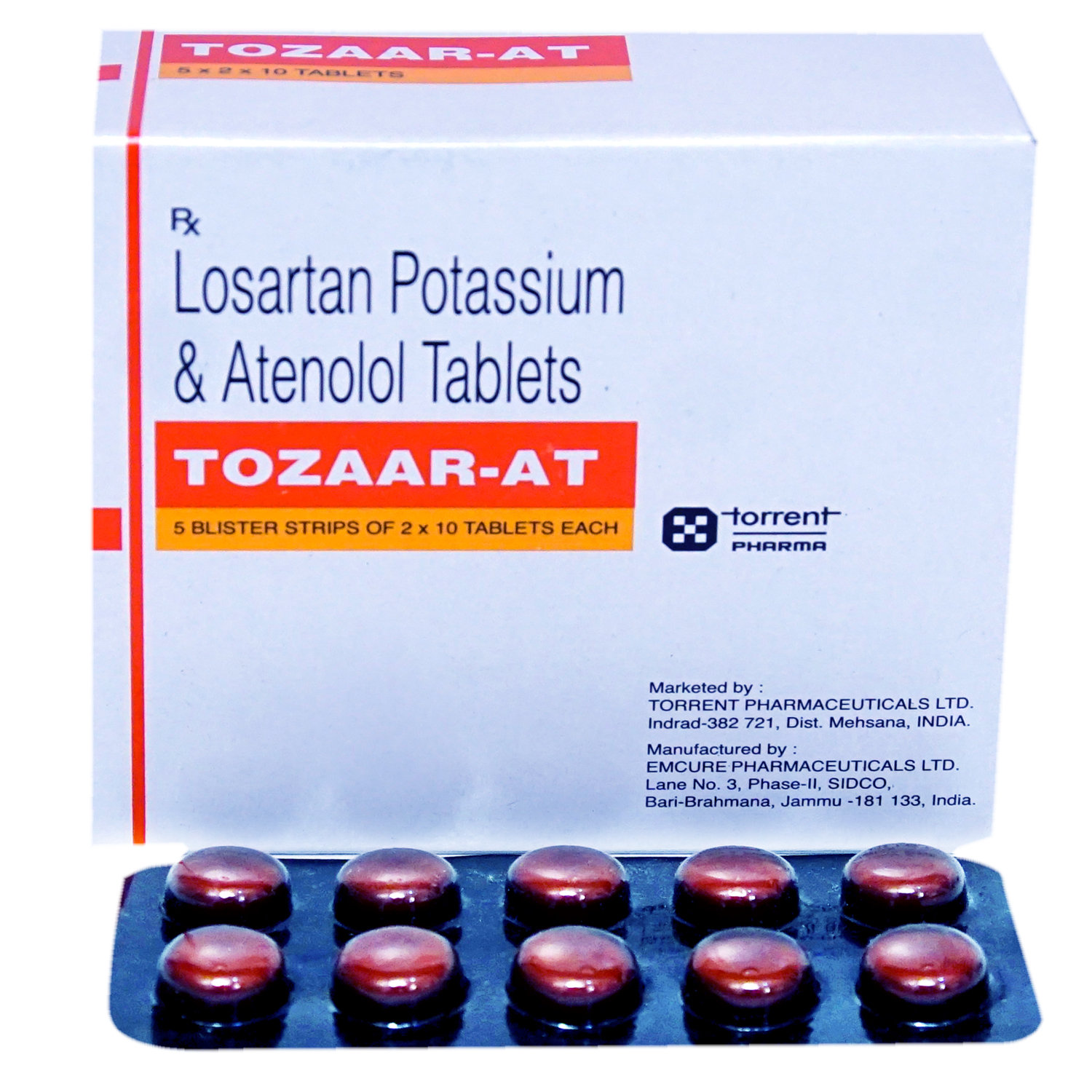Cardilo-AT Tablet 10's
MRP ₹90
(Inclusive of all Taxes)
₹13.5 Cashback (15%)
Provide Delivery Location
Online payment accepted
 Prescription drug
Prescription drugWhats That
Composition :
Manufacturer/Marketer :
Consume Type :
Expires on or after :
Return Policy :
About Cardilo-AT Tablet
Cardilo-AT Tablet belongs to a class of combination drugs called 'anti-hypertensive' primarily used to treat hypertension (high blood pressure). Hypertension (high blood pressure) is a lifelong or chronic condition in which the blood pressure against the artery walls becomes too high. This can lead to damaged blood vessels leading to heart disease, stroke, kidney disease, and other problems.
Cardilo-AT Tablet is a combination of Losartan (angiotensin II receptor blockers) and Atenolol (a beta-blocker). Losartan works by blocking a hormone called angiotensin II thereby preventing blood vessels from narrowing, lowering the blood pressure, and improving the overall blood flow. Atenolol works by blocking stress hormones like adrenaline and epinephrine, thereby slowing down the increased heart rate. Thus, it collectively helps lower raised blood pressure, reducing the chances of heart attack or stroke in the future.
Take Cardilo-AT Tablet as prescribed by your doctor. You are advised to take Cardilo-AT Tablet for as long as your doctor has prescribed it for you, depending upon your medical condition. The most common side effects of Cardilo-AT Tablet are nausea, dizziness, taste change, headache, cold extremities, slow heart rate, increased potassium level, constipation, tiredness, and decreased blood pressure. They do not require medical attention and gradually resolve over time. However, if the side effects are persistent, reach out to your doctor.
Inform your doctor if you have had an allergic reaction to Cardilo-AT Tablet , are pregnant or are planning to get pregnant, are breastfeeding, have liver disease, kidney disease, heart failure, a heart valve problem, or have a history of a heart attack. You must closely monitor your blood pressure if you ever have had a stroke, heart attack, or currently taking other blood pressure-lowering pills. It is advised to continue taking this drug and not stop taking it suddenly without consulting your doctor. It is advisable to drink plenty of fluids while taking this medicine. However, kidney patients should avoid taking plenty of fluids. Avoid potassium supplements with Cardilo-AT Tablet as they may lead to high potassium levels in the blood.
Uses of Cardilo-AT Tablet
Directions for Use
Key Benefits
Cardilo-AT Tablet belongs to a class of combination drug called 'anti-hypertensive' primarily used to treat hypertension (high blood pressure). Cardilo-AT Tablet is a combination drug containing Losartan (angiotensin II receptor blockers) and Atenolol (a beta-blocker). Losartan works by blocking a hormone called angiotensin II thereby preventing blood vessels from narrowing, lowering the blood pressure, and improving the overall blood flow. Besides this, it also protects your kidneys if you have both kidney disease and diabetes. Atenolol works by blocking stress hormones like adrenaline and epinephrine, thereby slowing down the increased heart rate. Thus, it collectively helps lower raised blood pressure, reducing the chances of heart attack or stroke in the future.
Storage
- Inform your doctor about dizziness symptoms. They may adjust your medication regimen or prescribe additional medications to manage symptoms.
- Follow your doctor's instructions for taking medication, and take it at the same time every day to minimize dizziness.
- When standing up, do so slowly and carefully to avoid sudden dizziness.
- Avoid making sudden movements, such as turning or bending quickly, which can exacerbate dizziness.
- Drink plenty of water throughout the day to stay hydrated and help alleviate dizziness symptoms.
- If you're feeling dizzy, sit or lie down and rest until the dizziness passes.
- Track when dizziness occurs and any factors that may trigger it, and share this information with your doctor to help manage symptoms.
- Remember, managing depression as a side effect of medication requires patience, persistence, and collaboration with your healthcare team.
- Tell your doctor about your depression symptoms to adjust medication.
- Consult a therapist or counsel for emotional support.
- Engage in regular exercise to release endorphins (neurotransmitters).
- Practice stress-reducing techniques like meditation and deep breathing.
- Build a support network of friends, family, and support groups.
- Establish a consistent sleep schedule.
- Eat a nutritious diet rich in fruits, vegetables, and whole grains.
- Limit or avoid alcohol and recreational substances.
- Keep a mood journal to track symptoms and progress.
- If you experience low blood pressure symptoms like dizziness, lightheadedness, or fainting while taking medication, seek immediate medical attention.
- Make lifestyle modifications and adjust your medication regimen under medical guidance to manage low blood pressure.
- As your doctor advises, regularly check your blood pressure at home. Record your readings to detect any changes and share them with your doctor.
- Fluid intake plays a vital role in managing blood pressure by maintaining blood volume, regulating blood pressure, and supporting blood vessel function. Drinking enough fluids helps prevent dehydration, maintain electrolyte balance, and regulate fluid balance.
- Take regular breaks to sit or lie down if you need to stand for long periods.
- When lying down, elevate your head with extra pillows to help improve blood flow.
- Avoid heavy exercise or strenuous activities that can worsen low blood pressure.
- Wear compression socks as your doctor advises to enhance blood flow, reduce oedema, and control blood pressure.
- If symptoms persist or worsen, or if you have concerns about your condition, seek medical attention for personalized guidance and care.
- Reducing the amount of time you spend outside and indoors in the cold.
- keeping your hands warm by donning mittens, gloves, or other protective clothing.
- Observing a skincare regimen that safeguards your fingers and hands.
- To improve circulation, give your hands and feet a little massage.
- Exercising regularly helps lower the risk of heart problems.
- Maintain a healthy diet, including vegetables and fruits.
- Rest well; get enough sleep.
- Manage stress with yoga and meditation.
- Limit alcohol and smoking.
- Inform your doctor about dizziness symptoms. They may adjust your medication regimen or prescribe additional medications to manage symptoms.
- Follow your doctor's instructions for taking medication, and take it at the same time every day to minimize dizziness.
- When standing up, do so slowly and carefully to avoid sudden dizziness.
- Avoid making sudden movements, such as turning or bending quickly, which can exacerbate dizziness.
- Drink plenty of water throughout the day to stay hydrated and help alleviate dizziness symptoms.
- If you're feeling dizzy, sit or lie down and rest until the dizziness passes.
- Track when dizziness occurs and any factors that may trigger it, and share this information with your doctor to help manage symptoms.
Drug Warnings
Do not take Cardilo-AT Tablet if you are allergic to Cardilo-AT Tablet or any of its ingredients. If you have diabetes, kidney, or liver problems, please inform your doctor before taking Cardilo-AT Tablet . Cardilo-AT Tablet is not recommended for pregnant women. It has atenolol, a pregnancy category D drug, especially in second and third trimesters, as it may cause serious harm to the unborn baby (fetus). Therefore, pregnant or breastfeeding women are advised to consult a doctor before taking Cardilo-AT Tablet . Do not consume alcohol with Cardilo-AT Tablet as it may increase the risk of low blood pressure. Avoid potassium supplements with Cardilo-AT Tablet as they may lead to high potassium levels in the blood. Regular blood tests and blood pressure monitoring are recommended while taking Cardilo-AT Tablet .
Drug-Drug Interactions
Drug-Drug Interactions
Login/Sign Up
Taking verapamil with Cardilo-AT Tablet can increase the risk or severity of verapamil side effects.
How to manage the interaction:
Taking Cardilo-AT Tablet and Verapamil together can result in an interaction, it can be taken if a doctor has advised it. However, if you experience, fatigue, headache, fainting, swelling of the extremities, weight gain, shortness of breath, chest pain, increased or decreased heartbeat, or irregular heartbeat, contact a doctor immediately. Do not discontinue any medications without consulting a doctor.
Using dolasetron together with Cardilo-AT Tablet can increase the risk of an irregular heart rhythm that may be serious.
How to manage the interaction:
Although there is a possible interaction between Cardilo-AT Tablet and Dolasetron, you can take these medicines together if prescribed by a doctor. If you have any of these symptoms, like feeling dizzy, lightheaded, or your heart beating irregularly, it's important to call a doctor right away. Do not stop using any medications without talking to a doctor.
Coadministration of Cardilo-AT Tablet with aminophylline could certainly reduce the efficacy of Cardilo-AT Tablet and enhance the effects of aminophylline.
How to manage the interaction:
Taking Cardilo-AT Tablet alongside aminophylline can result in an interaction, it can be taken if a doctor has advised it. However, if you experience nausea, vomiting, insomnia, tremors, restlessness, uneven heartbeats, or difficulty breathing, contact a doctor immediately. Do not discontinue any medications without consulting a doctor.
Using Cardilo-AT Tablet with theophylline, could increase the effects of theophylline.
How to manage the interaction:
Taking Cardilo-AT Tablet and theophylline together can result in an interaction, it can be taken if a doctor has advised it. However, if you experience nausea, vomiting, insomnia, shaking of hands and legs, restlessness, uneven heartbeats, or difficulty breathing, contact the doctor immediately. Do not discontinue any medications without consulting a doctor.
Coadministration of Cardilo-AT Tablet and Nebivolol may increase the risk of irregular heart rhythm.
How to manage the interaction:
Taking Cardilo-AT Tablet and Nebivolol together can result in an interaction, it can be taken if a doctor has advised it. Do not discontinue any medications without consulting a doctor.
When Bisoprolol is combined with Cardilo-AT Tablet the severity or risk of side effects may be increased.
How to manage the interaction:
Although there may be an interaction, Cardilo-AT Tablet can be taken with bisoprolol if prescribed by the doctor. Consult the prescriber if you experience any unusual side effects. Do not discontinue the medication without consulting a doctor.
Coadministration of Cardilo-AT Tablet with ceritinib can slow heart rate and increase the risk of an irregular heart rhythm.
How to manage the interaction:
Taking Cardilo-AT Tablet and ceritinib together can result in an interaction, it can be taken if a doctor has advised it. However, if you experience dizziness, lightheadedness, fainting, or an irregular heartbeat while taking these medications, consult the doctor immediately. Do not discontinue any medications without consulting a doctor.
Coadministration of Tizanidine and Cardilo-AT Tablet can increase the risk or severity of side effects like low blood pressure.
How to manage the interaction:
Taking Cardilo-AT Tablet and tizanidine together may result in an interaction, it can be taken if your doctor has recommended it. However, if you experience headache, dizziness, lightheadedness, sweating, or palpitations, consult the doctor. Do not discontinue any medications without consulting a doctor.
The use of atazanavir with Cardilo-AT Tablet may raise the risk of an abnormal heart rhythm.
How to manage the interaction:
The combination of Cardilo-AT Tablet and acebutolol may result in an interaction, it can be taken if a doctor has advised it. However, if you develop sudden dizziness, lightheadedness, fainting, or irregular heartbeat, contact the doctor immediately. Do not stop using any medications without a doctor's advice.
Taking Cardilo-AT Tablet and diltiazem together may lead to increased side effects.
How to manage the interaction:
Taking Cardilo-AT Tablet and diltiazem together can result in an interaction, it can be taken if a doctor has recommended it. However, if you experience tiredness, headache, fainting, swelling of the extremities, weight gain, shortness of breath, chest discomfort, increased or reduced heartbeat, or irregular heartbeat, consult the doctor. Do not discontinue any medications without consulting doctor.
Drug-Food Interactions
Drug-Food Interactions
Login/Sign Up
Lentils, Orange Juice, Oranges, Raisins, Potatoes, Salmon Dried, Spinach, Tomatoes, Sweet Potatoes, Coconut Water, Beans, Beetroot, Broccoli, Bananas, Apricots, Avocado, Yogurt
How to manage the interaction:
Consumption of orange, orange juice and potassium containing products along with Losartan and Atenolol may increase the risk of side effects. Avoid consuming a lot of orange, orange juice and potassium containing products along with Losartan and Atenolol may increase the risk of side effects such as weakness, irregular heartbeat, confusion, tingling of the extremities, or feelings of heaviness in the legs, contact a doctor.
Diet & Lifestyle Advise
- Maintain a low salt diet and minimize eating processed foods as they contain more sodium. Try to replace salt with spices or herbs to add flavor to the food.
- Do regular exercise such as cycling, walking, jogging, dancing, or swimming for a minimum of 30 minutes per day.
- Chronic stress may also cause high blood pressure. Therefore, avoid stress triggers and make time for yourself to relax and do activities that you enjoy.
- Maintain a diet that is rich in fruits, vegetables, whole grains, and low-fat dairy products.
- Avoid smoking and alcohol intake.
Side Effects of Cardilo-AT Tablet
- Nausea
- Taste change
- Headache
- Cold extremities
- Slow heart rate
- Dizziness
- Increased potassium level
- Constipation
- Tiredness
- Decreased blood pressure
Habit Forming
Therapeutic Class
All Substitutes & Brand Comparisons
RX
Out of StockBristan AT Tablet
Brilliant LifeSciences Pvt Ltd
₹65
(₹5.85 per unit)
27% CHEAPERRX
Out of StockEtotan-AT 50mg/50mg Tablet
Solitaire Pharmacia Pvt Ltd
₹69
(₹6.21 per unit)
23% CHEAPERRX
Out of StockLotpol AT 50mg/50mg Tablet
₹108
(₹9.72 per unit)
20% COSTLIER
Drug-Diseases Interactions
Drug-Diseases Interactions
Login/Sign Up
FAQs
Drug-Drug Interactions Checker List
- IBUPROFEN
- ASPIRIN
- LISINOPRIL
- ENALAPRIL
- RAMIPRIL
- BENAZEPRIL
- CAPTOPRIL
- FOSINOPRIL
- PERINDOPRIL
- QUINAPRIL
- ALISKIREN
- AMILORIDE
- SPIRONOLACTONE
- TRIAMTERENE
- HEPARIN
- TIZANIDINE
- TRIMETHOPRIM
- POTASSIUM
Special Advise
- Monitor your blood pressure regularly, and if you notice any fluctuations, please consult a doctor.
- A low salt diet and regular exercise are recommended along with Cardilo-AT Tablet for effective results.
Disease/Condition Glossary
Hypertension: Blood pressure is the measurement of the force that our heart uses to pump blood to all body parts. Hypertension is a chronic condition when blood pressure is too high. This condition can lead to hardened arteries (blood vessels), decreasing the blood and oxygen flow to the heart. Raised blood pressure can cause chest pain (angina) and heart attack (when blood supply to the heart is blocked). Additionally, high blood pressure also causes brain damage (stroke) and kidney failure. High blood pressure can be diagnosed with the help of a blood pressure monitor. Systolic pressure is the pressure with which the heart pumps blood out. On the other hand, diastolic pressure is when your heart is at the resting stage between heartbeats. If your blood pressure is 140/90 mm of Hg, it means the systolic pressure is 140 mm of Hg, and diastolic pressure is 90 mm of Hg. Ideal blood pressure should be between 90/60 mm of Hg and 120/80 mm of Hg.

Have a query?
Alcohol
Safe if prescribed
Avoid alcohol consumption while taking Cardilo-AT Tablet as it may cause dizziness or lightheadedness.
Pregnancy
Consult your doctor
Cardilo-AT Tablet contains atenolol, which is a pregnancy category D drug. When Cardilo-AT Tablet is used in the pregnancy during the 2nd and 3rd trimesters, it affects the renin-angiotensin system can cause injury and even death to the unborn baby. So when pregnancy is detected, Cardilo-AT Tablet should be discontinued as soon as possible.
Breast Feeding
Consult your doctor
Avoid breastfeeding while taking Cardilo-AT Tablet as it may be unsafe for the baby.
Driving
Safe if prescribed
Cardilo-AT Tablet may cause dizziness or drowsiness in some people. So, drive only if you are alert after taking Cardilo-AT Tablet .
Liver
Consult your doctor
Cardilo-AT Tablet to be taken with caution, especially if you have a history of Liver diseases/conditions. The dose may have to be adjusted by your doctor.
Kidney
Consult your doctor
Cardilo-AT Tablet to be taken with caution, especially if you have a history of Kidney diseases/conditions. The dose may have to be adjusted by your doctor.
Children
Safe if prescribed
It is not recommended for children below 6 years. However, for children above 6 years, give Cardilo-AT Tablet in doses as prescribed by a doctor.





